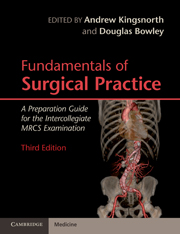Book contents
- Frontmatter
- Contents
- List of contributors
- Preface
- Section 1 Basic Sciences Relevant to Surgical Practice
- Section 2 Basic Surgical Skills
- Section 3 The Assessment and Management of the Surgical Patient
- Section 4 Perioperative Care of the Surgical Patient
- 11 Fundamentals of intestinal failure and nutrition
- 12 Enhanced recovery after surgery
- 13 Fundamentals of intensive care
- 14 Caring for surgical patients: complications and communication
- 15 Management of sepsis
- Section 5 Common Surgical Conditions
- Index
- References
14 - Caring for surgical patients: complications and communication
Published online by Cambridge University Press: 03 May 2011
- Frontmatter
- Contents
- List of contributors
- Preface
- Section 1 Basic Sciences Relevant to Surgical Practice
- Section 2 Basic Surgical Skills
- Section 3 The Assessment and Management of the Surgical Patient
- Section 4 Perioperative Care of the Surgical Patient
- 11 Fundamentals of intestinal failure and nutrition
- 12 Enhanced recovery after surgery
- 13 Fundamentals of intensive care
- 14 Caring for surgical patients: complications and communication
- 15 Management of sepsis
- Section 5 Common Surgical Conditions
- Index
- References
Summary
‘Every surgeon carries about him a little cemetery, in which from time to time he goes to pray. A cemetery of bitterness and regret, of which he seeks the reason for certain of his failures.’
La Philosophie de la Chirurgie. René Leriche, 1879–1955Introduction
Surgery creates a unique relationship between patient and practitioner. The impact of serious illness, particularly cancer, and the surgery required to treat it may impose lifelong physical and psychological burdens. These consequences are unlikely to be confined to the individual, as the patient's family and even wider society may be affected.
Establishment and maintenance of trust and the relationship of care between a surgeon and his or her patients facilitates the necessary physical and psychological transitions after major surgery. Optimal outcomes depend on this relationship as well as good preoperative preparation, optimum surgery and meticulous postoperative management.
Outcomes after surgery are influenced by:
preoperative physiological status
operative severity and
the provision of appropriate care.
Surgeons can minimize the deleterious effects of the surgical insult by careful preoperative planning, meticulous intraoperative technique and by accurate postoperative care.
Preoperative physiological status
Preoperative co-existing medical problems translate into increased operative risk. The simplest tool to assess patient risk factors is the American Association of Anesthetists (ASA) scale. This is a subjective assessment of the patient's operative risk based on the presence and severity of co-existing medical problems, which are detected by routine history and physical examination. Increasing ASA grade correlates with increased risk of postoperative complications.
- Type
- Chapter
- Information
- Fundamentals of Surgical PracticeA Preparation Guide for the Intercollegiate MRCS Examination, pp. 230 - 247Publisher: Cambridge University PressPrint publication year: 2011

